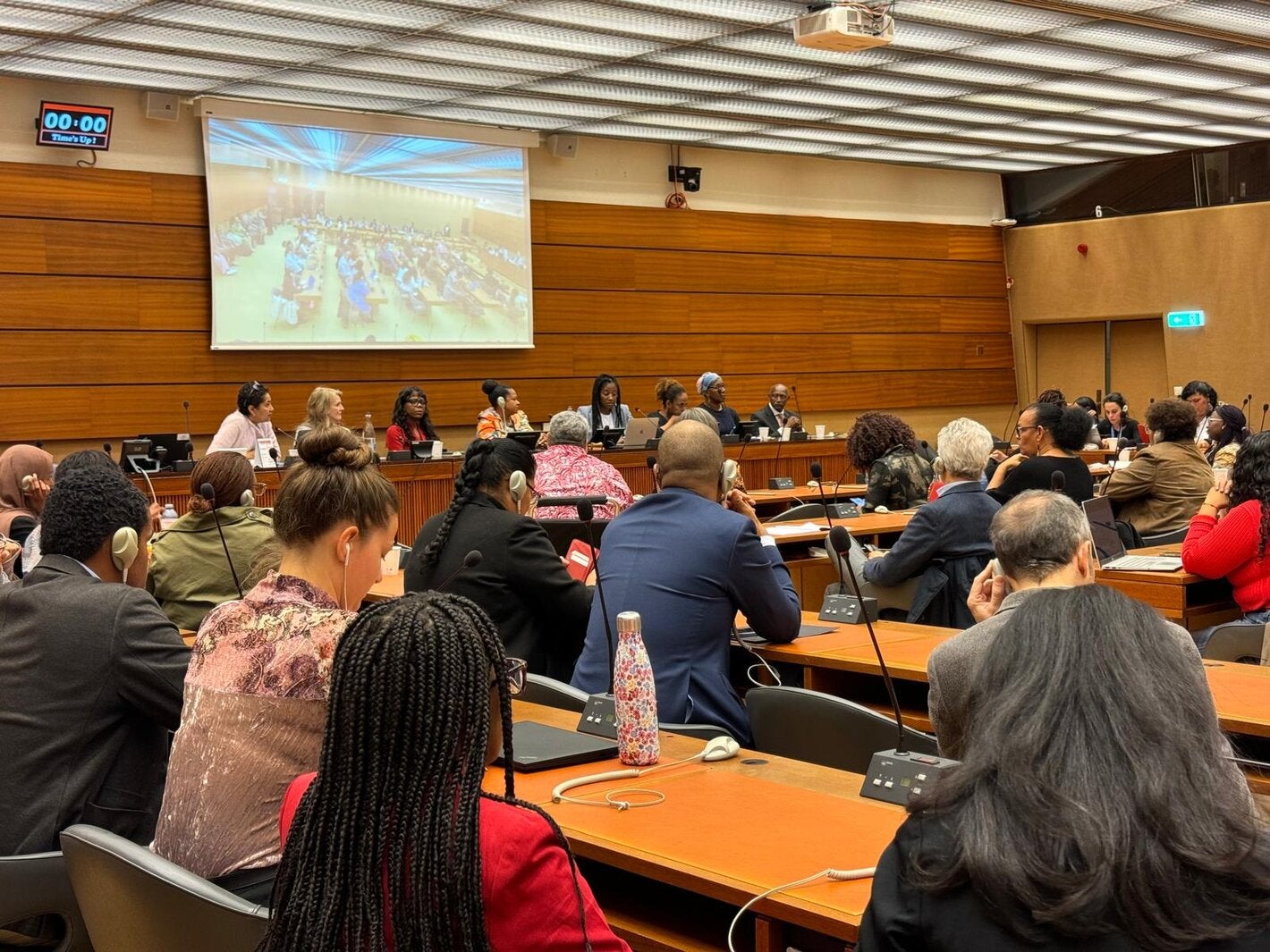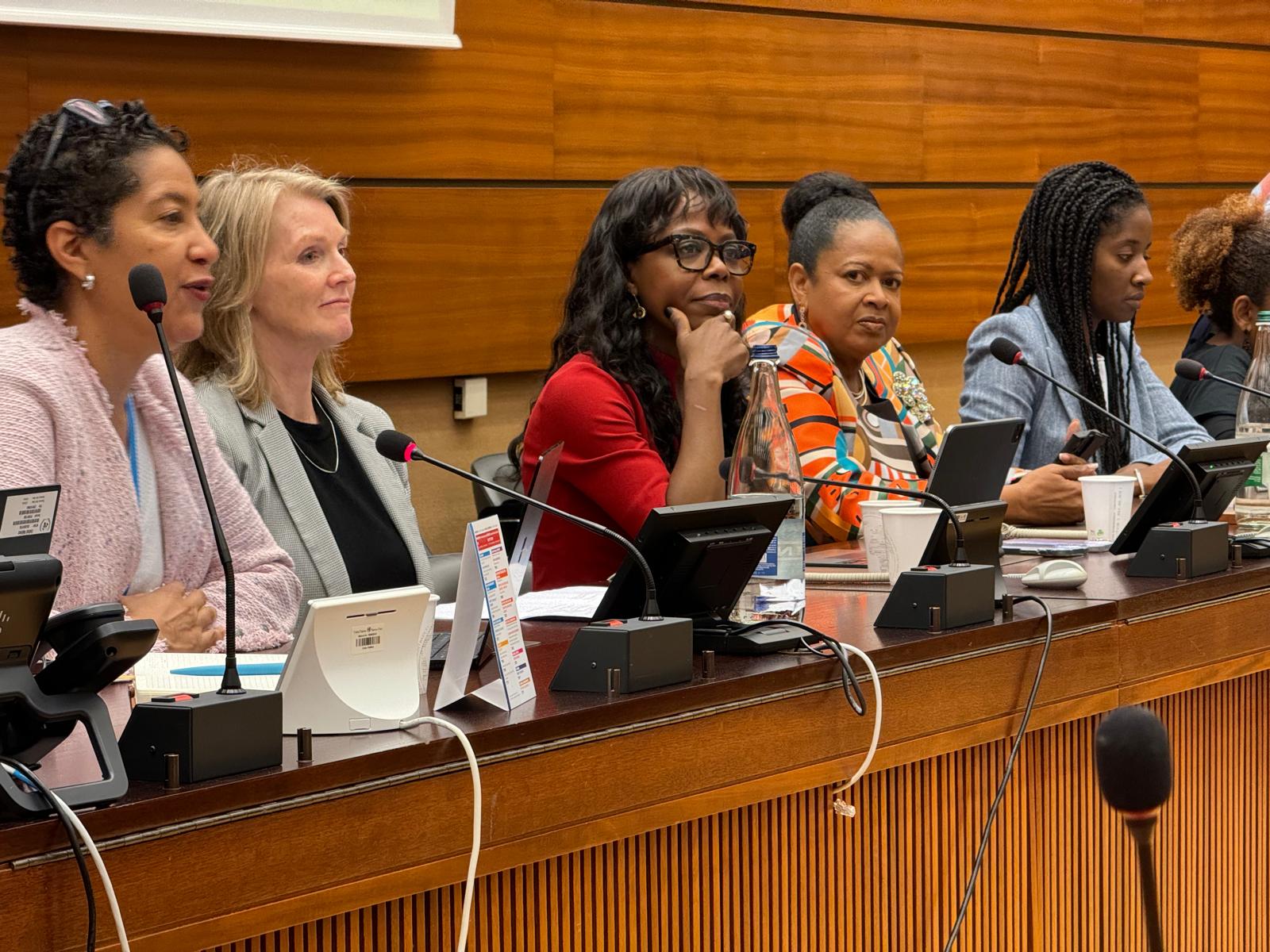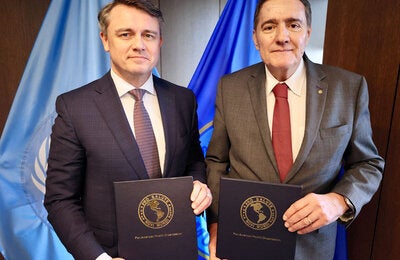
PAHO co-organized with UNFPA the side event Equity in Health: Promoting and guaranteeing the health and well-being of people of African descent in the Americas.
Washington, D.C., April 17, 2024 - During the third session of the Permanent Forum of Afrodescendants, held in Geneva, Switzerland, from April 16-19, PAHO coordinated the side event Equity in Health: Promoting and guaranteeing the health and well-being of people of African descent in the Americas, where it presented the advances and recommendations resulting from the consultation processes on equity in health carried out in recent months.
The Permanent Forum of People of African Descent called for a Second International Decade for People of African Descent and asked PAHO and WHO for a report on the health situation of people of African descent in the Americas region.
At the opening of the third session of the Permanent Forum, WHO Director-General Tedros Adhanom Ghebreyesus called for such a second Decade to promote recognition and justice, and to fight racism and discrimination. The first Decade for People of African Descent was proclaimed by the United Nations General Assembly in December 2014 and concludes this year.
PAHO side event
Co-organized with UNFPA and WHO, the side event was attended representatives from various countries of the Americas, including Brazil, which will host a regional event on ethnicity and health in July 2024 with the support of PAHO.
The Director of the Department of Gender, Diversity, Equity and Human Rights at the WHO, Erin Kenney; the Program Advisor for the UNFPA Global Initiative for People of African Descent, Patricia Da Silva, and the Chair of the United Nations Permanent Forum for People of African Descent, June Soomer, delivered opening remarks, where they addressed the remaining gaps in redress and injustice and urged member states to support the recommendations to ensure that people of African descent enjoy the full realization of their human rights on an equal basis, eliminating discrimination, racism and all other related forms of violence.
The panel discussion moderated by the head of PAHO's Gender and Equity Unit, Jessie Schutt-Ainé, and comprised of Eidy Yerlin Mosquera Perea, from UbuntuEs; Siannie Palmer, from Costa Rica; and Marcia Regina de Lima Silva, Representing Brazil’s National Secretary for Affirmative Action Policies, Combating and Overcoming Racism of the Ministry of Racial Equality.
PAHO presented the progress made in the Americas in terms of the health of people of African descent, including the results of the processes led by PAHO in this area and framed in the Ethnicity and Health Policy and its Strategy and Plan of Action 2019-2025.
The organization UbuntuEs, a pioneer in the creation of Afro-centered psychotherapeutic healing spaces, briefly presented its experience on mental health care for people of African descent and advocated for the fundamental right to mental health of these populations. This organization has worked in different sections of the Permanent Forum on people of African descent, as evidenced by the first report on Afro-descendant Mental Health published by the Office of the United Nations High Commissioner for Human Rights.
Siannie Palmer presented her experience in maternal and perinatal health care for people of African descent in Costa Rica. Palmer has worked since 2002 in the Costa Rican Social Security Fund, initially in a Regional Hospital and later in the Talamanca Health Area, in the province of Limón, on the shores of the Caribbean Sea, where she established sexual and reproductive health services and had the opportunity to accompany indigenous, Afro-descendant, migrant and other ethnic women. She worked hard to incorporate the human rights approach in the care provided, understanding that the best way to do this is the community approach with symmetry, empathy and respect. She spoke briefly on maternal mortality and inequities in maternal health care for Afro-descendant women.
Finally, Marcia Regina de Lima Silva presented Brazil's experience in the struggle to guarantee equity and human rights for people of African descent and its leadership role in promoting the implementation and fulfillment of the commitments undertaken, including the Policy on Ethnicity and Health.
Pastor Murillo, member of the Permanent Forum of People of African Descent, closed by reminding the audience that the purpose of the declaration is to summarize and incorporate the standards of the rights of people of African descent, which can be classified into three generations: a first that has to do with issues related to the right to freedom, so that the declaration has to recognize the contribution of people of African descent in the construction of the global economy and its impacts; a second generation of rights are those related to non-discrimination and equality and recognition of people of African descent as a distinct ethnic group and as a collective subject, which includes the recognition of our traditional practices and ancestral knowledge; and a third generation would be characterized by restorative justice, which today is the cornerstone of the agenda of people of African descent at the international level and will be for decades to come, climate justice, and artificial intelligence and algorithmic bias, which can lead to contemporary forms of racial discrimination.
In his speech, Murillo hoped that the Second International Decade for People of African Descent would be proclaimed. He hoped that it will be announced, even unanimously, at the end of 2024 at the same closing ceremony of the First Decade.
PAHO recommendations
During the event, PAHO addressed the recommendations made to the Forum following the three subregional consultations held in recent months. The first of these was held in Chile in October 2023 with countries in South America; the second was held virtually with the countries of the Caribbean Region in January 2024; and the third took place in early April in Honduras and focused on Central America, Cuba, Mexico and the Dominican Republic.
These consultations, in turn, contribute to PAHO's efforts to improve the health situation of people of African descent in the framework of the implementation of the Strategy and Plan of Action on Ethnicity and Health 2019-2025. PAHO reiterates its commitment to work in coordination with its counterparts and strategic partners to contribute to the improvement of the health and well-being of the different Afro-descendant populations of the Americas and universal health.
Also, during the side event PAHO also presented the progress made in the Americas in the area of Afro-descendant health as a result of the processes led by PAHO and framed within the Ethnicity and Health Policy and its Strategy and Plan of Action.




